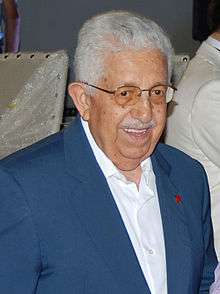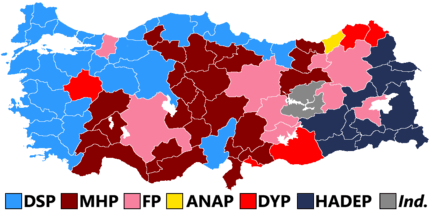Turkish general election, 1999
| | |||||||||||||||||||||||||||||||||||||||||||||||||||||||||||||||||||||||||||||||||||||||||||||||||||
| |||||||||||||||||||||||||||||||||||||||||||||||||||||||||||||||||||||||||||||||||||||||||||||||||||
| |||||||||||||||||||||||||||||||||||||||||||||||||||||||||||||||||||||||||||||||||||||||||||||||||||
|
| |||||||||||||||||||||||||||||||||||||||||||||||||||||||||||||||||||||||||||||||||||||||||||||||||||
| |||||||||||||||||||||||||||||||||||||||||||||||||||||||||||||||||||||||||||||||||||||||||||||||||||
 |
| This article is part of a series on the politics and government of Turkey |
|
See also
|
Turkey's 14th general election was held on Sunday April 18, 1999 and was the first election in Turkish history to combine local, council and parliamentary elections on the same day. Bülent Ecevit's Democratic Left Party (DSP), soaring in popularity after the capture of PKK leader Abdullah Öcalan, emerged as the biggest party and swept the board in most of Turkey's western provinces. It failed, however, to obtain an overall majority, and did not do nearly as well in the eastern provinces.
The second largest party (dubbed "the second winner" by the press the following day) became the Nationalist Movement Party (MHP), which performed strongly nationwide, producing MPs from nearly all of the country's 81 provinces. The largest party of the last election, the Virtue Party (FP), returned to opposition after shedding forty-seven seats and a million votes. The decline of the Republican People's Party continued; this was the first time the party failed to exceed the 10 percent threshold for parliamentary representation.
Results
Total votes and seats for each party
| Parties | Votes | Seats | ||||
|---|---|---|---|---|---|---|
| No. | % | +− % | No. | +− | ||
| Democratic Left Party (Demokratik Sol Parti) | 6,919,670 | 22.19 | +7.55 | 136 | +60 | |
| Nationalist Movement Party (Milliyetçi Hareket Partisi) | 5,606,583 | 17.98 | +9.8 | 129 | +129 | |
| Virtue Party (Fazilet Partisi) | 4,805,381 | 15.41 | -5.97 | 111 | -47 | |
| Motherland Party (Anavatan Partisi) | 4,122,929 | 13.22 | -6.43 | 86 | -46 | |
| True Path Party (Doğru Yol Partisi) | 3,745,417 | 12.01 | -7.13 | 85 | -50 | |
| Republican People's Party (Cumhuriyet Halk Partisi) | 2,716,094 | 8.71 | -2.00 | 0 | -49 | |
| People's Democracy Party (Halkın Demokrasi Partisi) | 1,482,196 | 4.75 | +0.58 | 0 | 0 | |
| Great Union Party (Büyük Birlik Partisi) | 456,353 | 1.46 | 0 | |||
| Freedom and Solidarity Party (Özgürlük ve Dayanışma Partisi) | 248,553 | 0.80 | 0 | |||
| Democratic Turkey Party (Demokrat Türkiye Partisi) | 179,871 | 0.58 | 0 | |||
| Liberal Democratic Party (Liberal Demokrat Parti) | 127,174 | 0.41 | 0 | |||
| Democrat Party (Demokrat Parti) | 92,093 | 0.30 | 0 | |||
| Nation Party (Millet Partisi) | 79,370 | 0.25 | -0.20 | 0 | ||
| Peace Party (Barış Partisi) | 78,922 | 0.25 | 0 | |||
| Workers' Party (İşçi Partisi) | 57,607 | 0.18 | -0.04 | 0 | ||
| Labour Party (Emek Partisi) | 51,756 | 0.17 | 0 | |||
| Rebirth Party (Yeniden Doğuş Partisi) | 44,787 | 0.14 | -0.20 | 0 | ||
| Socialist Government Party (Sosyalist İktidar Partisi) | 37,680 | 0.12 | 0 | |||
| Changing Turkey Party (Değişen Türkiye Partisi) | 37,175 | 0.12 | 0 | |||
| Democracy and Peace Party (Demokrasi ve Barış Partisi) | 24,620 | 0.08 | 0 | |||
| Independents | 270.265 | 0.87 | +0.39 | 3 | +3 | |
| No. of valid votes | 31,184,496 | 100,00 | 550 | 0 | ||
| Invalid votes | 1,471,574 | |||||
| Electorate size | 37,495,217 | |||||
| Voter turnout | 87.09% | |||||
| ||||||
Effects
Coalition government
Bülent Ecevit formed the country's latest coalition government, against the FP, with the second-placed MHP and the fourth-placed motherland Party (ANAP) as a junior partner. The DYP was consulted during coalition negotiations, but ended up in opposition. The DSP-MHP-ANAP coalition turned out to be one of the most stable in many years, surviving without change until Ecevit's hospitalisation and subsequent refusal to resign in 2002 prompted a wave of resignations from the DSP and an early general election.

.jpg)

.jpg)
